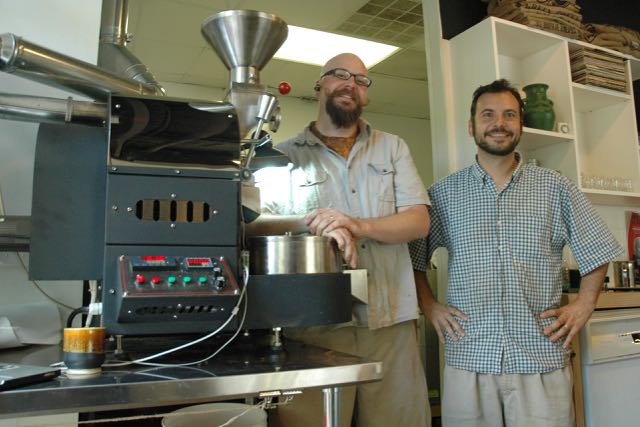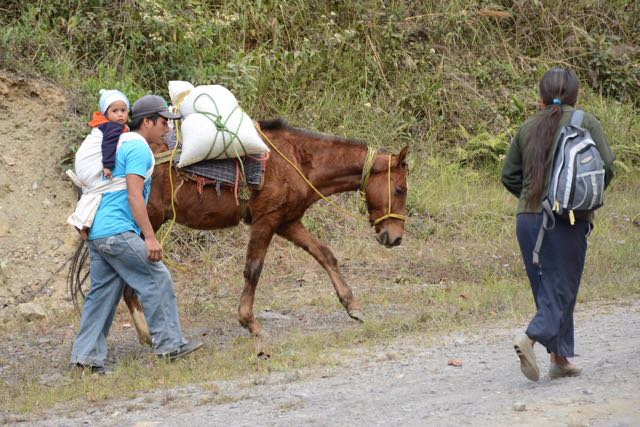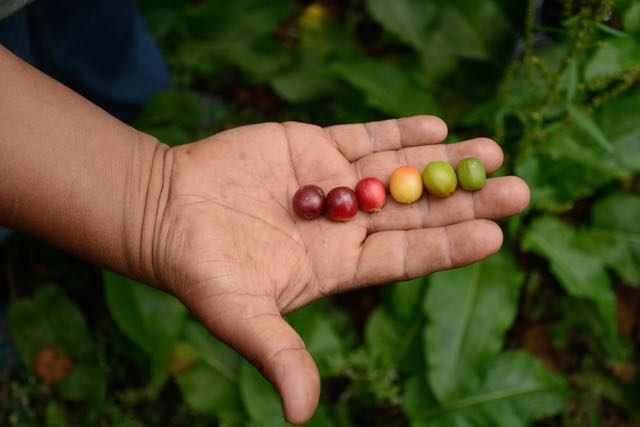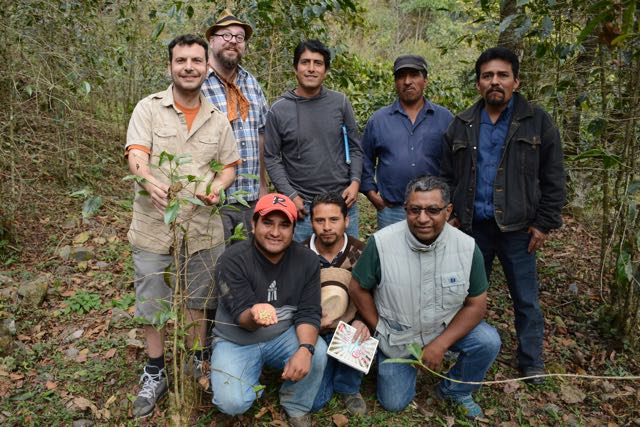Local coffee shop gives back to Mexican farming town
Patrick Dunn |
Wednesday, June 29, 2016
Most coffee shop owners could think of a lot of things to do with a $10,000 grant, but taking a trip to the town where their coffee is grown probably wouldn't be the first thing to come to mind.
However, that's exactly what Café Con Leche owner Jordi Carbonell did with a significant portion of the 2014
NEIdeas Challenge grant he was awarded. Carbonell put roughly half of the money towards buying his own coffee roaster, and the other half towards a trip to Mexico to source beans and make a personal connection with the people who grow them.
For Carbonell, the trip to Mexico was the natural next step for Cafe Con Leche. The business, which started in Southwest Detroit in 2007, became something of a community hub. Carbonell notes that it became a go-to spot for students from nearby Western International High School to wait for their rides home, and a regular destination for community organizations to meet.
 Hooton, Carbonell, and the coffee roaster
Hooton, Carbonell, and the coffee roaster
"Cafe Con Leche was focused on social movements and social things happening in the neighborhood," Carbonell says. "But I also wanted to be in the trend of latest coffees."
So in 2014, the same year Carbonell opened Cafe Con Leche's second location in the New Center at Grand Boulevard and Second Avenue, he hired his first in-house roaster, Chris Hooton. Carbonell had mustered the personnel and equipment he needed to start making his own signature product, but wasn't satisfied with just placing an order for the beans he was to roast.
"We wanted a relationship," says Carbonell. "We wanted to know exactly where the coffee is coming from and see the process—to see the tree, to see the bush, from crop to cup."
Before departing for Mexico in February 2015, Carbonell and Hooton established contact with Clemente Santiago Paz, an American-born coffee grader based in the key Mexican coffee-growing region of Oaxaca. Carbonell repeatedly notes that he was "pretty lucky" to connect with Paz, who strongly suggested a visit to the farming town of Talea de Castro.
"He went to this town a year ago," Carbonell says. "He said, 'I want you to see this town. Come with me.'"
Upon traveling to Talea de Castro, Hooton says he and Carbonell were amazed at how organically coffee was "infused into the entire fabric of the area." Because coffee thrives in the shade, coffee trees were planted right next to people's houses and directly in the forests surrounding the village. Coffee was Talea de Castro's livelihood and it had been for a long time. Hooton and Carbonell learned that many of the plants in the village were up to 60 years old, planted by the current villagers' grandparents.
 Talea de Castro farmers haul beans
Talea de Castro farmers haul beans
But Talea de Castro was far from stuck in its farming ways. Hooton notes that the farmers he and Carbonell met were developing a nursery to grow young plants to replace the 60-year-old legacy plants, which were reaching the end of their productive life. And the villagers had ambitions to remodel an abandoned schoolhouse in their town as a center for coffee investigation, where they might process and test some of their own product.
"The guys we were working with really had a vision for increasing the quality of life in their village by increasing the quality of their coffee," Hooton says.
Upon returning to Detroit, Carbonell began purchasing Talea de Castro coffee through the importer Axiom Coffee Ventures. But he wanted to do something more for the farmers he'd met there, whom he continued to keep in touch with. Since he began importing from Talea de Castro last year, Carbonell has wired $1 back to the villagers for every bag of their coffee that Cafe Con Leche has roasted and sold.
"They ask me, 'How much are you paying for the coffee?'" Carbonell says. "I say, 'Well, I pay a lot. But I’m feeling like I have to send something to you because you're not going to see a lot.'"
 A spectrum of coffee beansCarbonell's friends in Talea de Castro now regularly send him pictures of the progress they've made as a result, including clearing new ground for coffee production and doing some renovations on the old schoolhouse. Carbonell and Hooton both say the villagers have expressed some surprise at Carbonell's efforts to support them—especially given that the coffee industry is usually based on impersonal relationships between low-income farmers and their upper-class consumers hundreds or thousands of miles away.
"Anytime a business takes a relational interest in their producers and their supply line, they're going to feel that connection and want to give back," Hooton says. "We feel like these farmers are our friends. They extended hospitality to us and invited us into their houses and made coffee for us and made us feel like part of their families while we were there. It becomes more natural, then, to be generous and open-handed with what we do with their product."
Unfortunately, Talea de Castro coffee will be in very short supply this year—this year's crop was decimated by a fungus known as rust. But he and Carbonell say they intend to maintain a relationship with the village, buying the limited amount of Talea de Castro coffee that will be available this year and hopefully more in the future.
But their trip to Talea de Castro has affected more than just sourcing practices. It's also helped to ground them through difficult recent developments for their own business, as disagreements with Cafe Con Leche's landlord in Southwest Detroit led to the closing of that location earlier this year. That's a blow to the business' sense of participation in the Detroit community, as Carbonell and Hooton agree that Cafe Con Leche's New Center location has never been quite the community center that the Southwest location was.
A spectrum of coffee beansCarbonell's friends in Talea de Castro now regularly send him pictures of the progress they've made as a result, including clearing new ground for coffee production and doing some renovations on the old schoolhouse. Carbonell and Hooton both say the villagers have expressed some surprise at Carbonell's efforts to support them—especially given that the coffee industry is usually based on impersonal relationships between low-income farmers and their upper-class consumers hundreds or thousands of miles away.
"Anytime a business takes a relational interest in their producers and their supply line, they're going to feel that connection and want to give back," Hooton says. "We feel like these farmers are our friends. They extended hospitality to us and invited us into their houses and made coffee for us and made us feel like part of their families while we were there. It becomes more natural, then, to be generous and open-handed with what we do with their product."
Unfortunately, Talea de Castro coffee will be in very short supply this year—this year's crop was decimated by a fungus known as rust. But he and Carbonell say they intend to maintain a relationship with the village, buying the limited amount of Talea de Castro coffee that will be available this year and hopefully more in the future.
But their trip to Talea de Castro has affected more than just sourcing practices. It's also helped to ground them through difficult recent developments for their own business, as disagreements with Cafe Con Leche's landlord in Southwest Detroit led to the closing of that location earlier this year. That's a blow to the business' sense of participation in the Detroit community, as Carbonell and Hooton agree that Cafe Con Leche's New Center location has never been quite the community center that the Southwest location was.
 Carbonell and Hooton with Talea de Castro farmers
Carbonell and Hooton with Talea de Castro farmers
"Without [the Talea de Castro trip], especially having lost our roots in Southwest, we would really be scrambling to understand who we are now," Hooton says. "But because of the trip, because of this coffee, it's rooted us in our identity."
The basis of that identity is a spirit of community involvement, whether it's in Detroit or in an entirely different country. As Carbonell formulates plans to eventually buy a new property in Southwest, he says he definitely wants to have a roasting facility in the neighborhood; he's also planning a program this summer to teach kids in Southwest how to roast coffee. And while he awaits the return of Talea de Castro coffee, Carbonell is working his contacts in Southwest in hopes of finding a Detroiter with a personal connection to a Central or South American coffee producer.
"It's our business," Carbonell says. "If you want to really leave a mark on the world, you’ve got to do something for the community."
Support for this series on food and agriculture in Southeast Michigan is provided in part by the Detroit Food and Agriculture Network. See other stories in this series here.